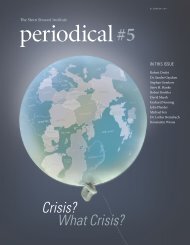View PDF - Stern Stewart Institute
View PDF - Stern Stewart Institute
View PDF - Stern Stewart Institute
- No tags were found...
You also want an ePaper? Increase the reach of your titles
YUMPU automatically turns print PDFs into web optimized ePapers that Google loves.
page34Arne Allée & Konstantin WronaGrowth in the Eye of the Stormfigure 22. What are you preparing your organization for these days?figure 35. What would be the effect of a euro break-down for your company?4%12%40%34%10%Strong upswingSlight upswingUpmost flexibility for bothSlight downturnStrong downturnStrongly negative 29%rather negative 46%neutral 24%positive 1%20% 40% 60% 80% 100%But when looking at probable scenarios, the mood is morepessimistic than a year ago. Steady growth in Westerneconomies is becoming more unlikely (-5 percent) whileinflationary tendencies have gained support by +13 percent.Overall, participating organizations are more likelyto prepare for a downturn (44 percent vs. 16 percent for anupswing). But, as many as 40 percent maintain flexibilityfor both (see figure 2).The likelihood of global disruptionBut there is more. Besides the cyclic and systemic dangersto the world economy, global disruption might arise froma major crisis as a result of the instability in the MiddleEast. Although the events are dominating the eveningnews, our ability to predict developments like the JasmineRevolution in the Arab world is limited as is the knowledgeabout the future course of major players such as Egypt.“There are many places we aren’t watching” meaning theinability to distinguish and identify people within theregion who might be allies for stability and peaceful development.The panel stated that while the sanctions on Iranare beginning to have an impact, further action is unclear.An attack would pose a considerable risk to the economysince it would take months to restore oil production oncetaken out. Refraining from attacking Iran and isolating itfurther into submission might lead other neighbors suchas Turkey and Saudi Arabia to become nuclear powers aswell. Yet, containment and deterrence already appear to beworking.»Non-OPEC supply has disappointedin the last 4-5 years.«Break-up of the euro zone?Two years ago, the Executive Vice Chairman of the Bankof America, Merrill Lynch, predicted no major Europeandefaults but “some government to falter” and “newlyelected leaders”. This prediction turned out to be true.Apart from Greece, a large majority of the participantsdoes not expect the euro zone to lose members but stronglysupports a Marshall plan to rescue southern EMU countries.This goes along with the Bundes bank’s determinationto maintain the euro.»The Bundesbank’s refusal to accept4 percent inflation is the guarantee thatthe euro will break up.«This might be in part because 75 percent expects a negativeor strongly negative effect on their companies (see figure 3)whereas just 1 percent expects a positive one. So, onething seems to be certain and that is that a break-upwould be a disaster. Will it? The clear dividing line ofopinions was the British Channel. Not only were Anglo-Saxon participants anticipating the break-up of the euroor a northern double currency by a “50 percent chance”,but for them it didn’t seem disastrous at all. The key pointfor both sides was the ability of European states to change.




